情态动词的推测性用法-文档资料
情态动词的推测性用法

表示推测:“估 计一定”
表示必然: “一定”
按可能性的程度的高低这九个情态动词可 分为三档 一,表“可能”: might / may/could / can 二,表“很有可能”: should/ ought to / would/will 三,表“最有可能”:must
2. 能做推测性用法的情态助动词的句法特征 A. 其后的不定式可以采取完成体形式 You must have thought about that. B.其后的不定式可以采取进行体形式 He must be working late at the office. C.可以用于there-存在句 There must be some mistake. D.其后的不定式为一般形式时通常是静态动词。 He must be there. E.主语可以使表示无生命的名词词组。 It must be George.
(三)might/could have done指 本来可能/能做而实际未做,表达 遗憾的感情色彩
You might have killed yourself本可能送命 I could have reported you本可以告发你 I could have passed the exam, but I failed. You could at least have sent five cards.你 本至少可以寄5张明信片的。
情态助动词的推测性用法
能做推测性用法的情态动词:共九个
情态动词 might / may could / can 非推测性用法 表示许可 表示能力许可 推测性用法 表示可能 表示可能
should/ ought to 表示义务: “应该”表示必然:“应该” would/will must 表示意志
表示推测的情态动词的用法归纳
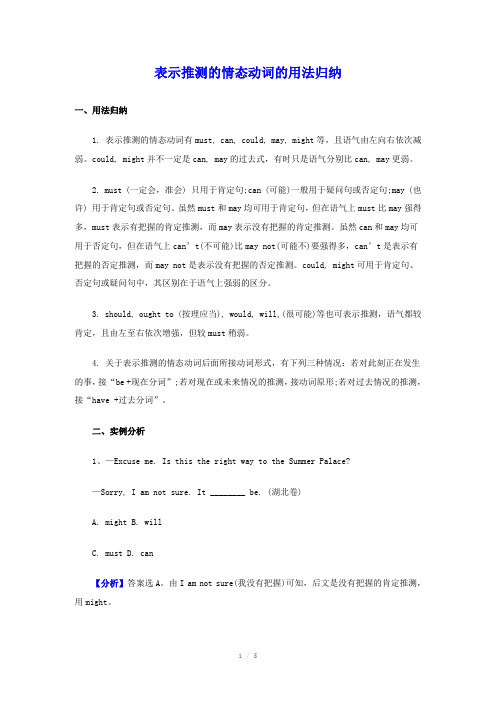
表示推测的情态动词的用法归纳一、用法归纳1. 表示推测的情态动词有must, can, could, may, might等,且语气由左向右依次减弱。
could, might并不一定是can, may的过去式,有时只是语气分别比can, may更弱。
2. must (一定会,准会) 只用于肯定句;can (可能)一般用于疑问句或否定句;may (也许) 用于肯定句或否定句。
虽然must和may均可用于肯定句,但在语气上must比may强得多,must表示有把握的肯定推测,而may表示没有把握的肯定推测。
虽然can和may均可用于否定句,但在语气上can’t(不可能)比may not(可能不)要强得多,can’t是表示有把握的否定推测,而may not是表示没有把握的否定推测。
could, might可用于肯定句、否定句或疑问句中,其区别在于语气上强弱的区分。
3. should, ought to (按理应当), would, will,(很可能)等也可表示推测,语气都较肯定,且由左至右依次增强,但较must稍弱。
4. 关于表示推测的情态动词后面所接动词形式,有下列三种情况:若对此刻正在发生的事,接“be +现在分词”;若对现在或未来情况的推测,接动词原形;若对过去情况的推测,接“have +过去分词”。
二、实例分析1、—Excuse me. Is this the right way to the Summer Palace?—Sorry, I am not sure. It ________ be. (湖北卷)A. mightB. willC. mustD. can【分析】答案选A。
由I am not sure(我没有把握)可知,后文是没有把握的肯定推测,用might。
2、You might just as well tell the manufacturer that male customers ________ not like the design of the furniture. (上海卷)A. mustB. shallC. mayD. need【分析】答案选C。
情态动词表推测用法总结
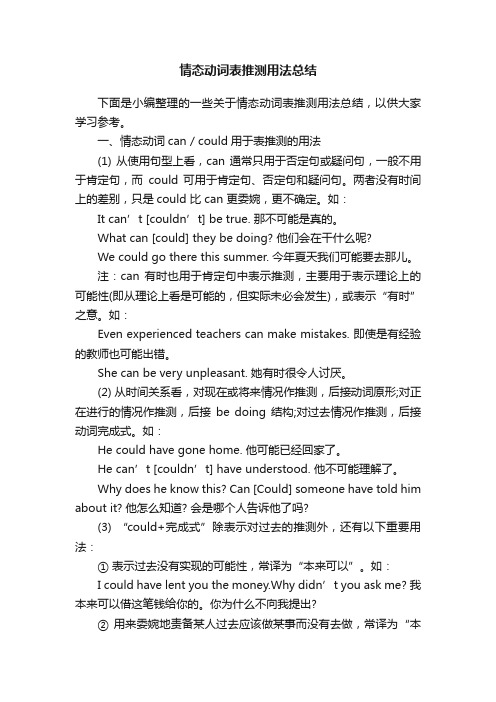
情态动词表推测用法总结下面是小编整理的一些关于情态动词表推测用法总结,以供大家学习参考。
一、情态动词can / could用于表推测的用法(1) 从使用句型上看,can 通常只用于否定句或疑问句,一般不用于肯定句,而could 可用于肯定句、否定句和疑问句。
两者没有时间上的差别,只是could 比 can 更委婉,更不确定。
如:It can’t [couldn’t] be true. 那不可能是真的。
What can [could] they be doing? 他们会在干什么呢?We could go there this summer. 今年夏天我们可能要去那儿。
注:can 有时也用于肯定句中表示推测,主要用于表示理论上的可能性(即从理论上看是可能的,但实际未必会发生),或表示“有时”之意。
如:Even experienced teachers can make mistakes. 即使是有经验的教师也可能出错。
She can be very unpleasant. 她有时很令人讨厌。
(2) 从时间关系看,对现在或将来情况作推测,后接动词原形;对正在进行的情况作推测,后接be doing 结构;对过去情况作推测,后接动词完成式。
如:He could have gone home. 他可能已经回家了。
He can’t [couldn’t] have understood. 他不可能理解了。
Why does he know this? Can [Could] someone have told him about it? 他怎么知道? 会是哪个人告诉他了吗?(3) “could+完成式”除表示对过去的推测外,还有以下重要用法:① 表示过去没有实现的可能性,常译为“本来可以”。
如:I could have lent you the money.Why didn’t you ask me? 我本来可以借这笔钱给你的。
情态动词表推测用法总结
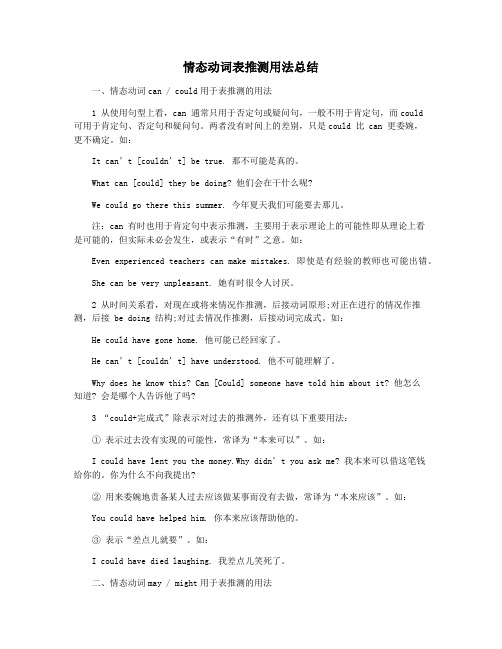
情态动词表推测用法总结一、情态动词can / could用于表推测的用法1 从使用句型上看,can 通常只用于否定句或疑问句,一般不用于肯定句,而could 可用于肯定句、否定句和疑问句。
两者没有时间上的差别,只是could 比 can 更委婉,更不确定。
如:It can’t [couldn’t] be true. 那不可能是真的。
What can [could] they be doing? 他们会在干什么呢?We could go there this summer. 今年夏天我们可能要去那儿。
注:can 有时也用于肯定句中表示推测,主要用于表示理论上的可能性即从理论上看是可能的,但实际未必会发生,或表示“有时”之意。
如:Even experienced teachers can make mistakes. 即使是有经验的教师也可能出错。
She can be very unpleasant. 她有时很令人讨厌。
2 从时间关系看,对现在或将来情况作推测,后接动词原形;对正在进行的情况作推测,后接 be doing 结构;对过去情况作推测,后接动词完成式。
如:He could have gone home. 他可能已经回家了。
He can’t [couldn’t] have understood. 他不可能理解了。
Why does he know this? Can [Could] someone have told him about it? 他怎么知道? 会是哪个人告诉他了吗?3 “could+完成式”除表示对过去的推测外,还有以下重要用法:① 表示过去没有实现的可能性,常译为“本来可以”。
如:I could have lent you the money.Why didn’t you ask me? 我本来可以借这笔钱给你的。
你为什么不向我提出?② 用来委婉地责备某人过去应该做某事而没有去做,常译为“本来应该”。
情态动词表推测
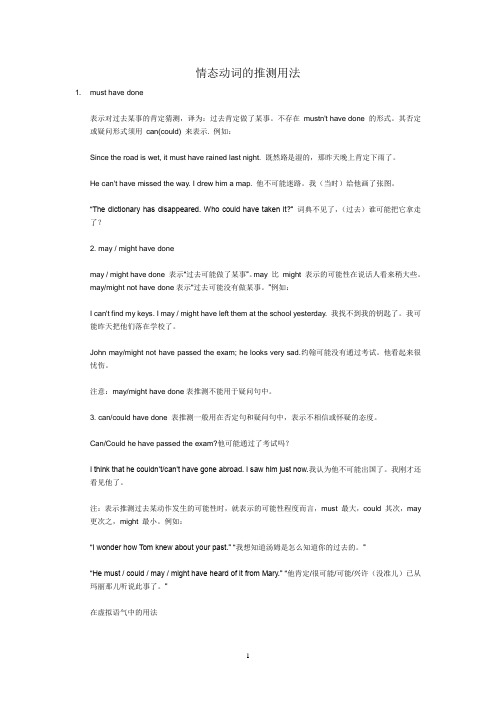
情态动词的推测用法1. must have done表示对过去某事的肯定猜测,译为:过去肯定做了某事。
不存在mustn't have done 的形式。
其否定或疑问形式须用can(could) 来表示. 例如:Since the road is wet, it must have rained last night. 既然路是湿的,那昨天晚上肯定下雨了。
He can't have missed the way. I drew him a map. 他不可能迷路。
我(当时)给他画了张图。
“The dictionary has disappeared. Who could have taken it?” 词典不见了,(过去)谁可能把它拿走了?2. may / might have donemay / might have done 表示“过去可能做了某事”。
may 比might 表示的可能性在说话人看来稍大些。
may/might not have done表示“过去可能没有做某事。
”例如:I can't find my keys. I may / might have left them at the school yesterday. 我找不到我的钥匙了。
我可能昨天把他们落在学校了。
John may/might not have passed the exam; he looks very sad.约翰可能没有通过考试。
他看起来很忧伤。
注意:may/might have done表推测不能用于疑问句中。
3. can/could have done 表推测一般用在否定句和疑问句中,表示不相信或怀疑的态度。
Can/Could he have passed the exam?他可能通过了考试吗?I think that he couldn‟t/can't have gone abroad. I saw him just now.我认为他不可能出国了。
(完整word版)Unit8ItmustbelongtoCarla知识点整理

Unit 8 It must belong to Carla.语法情态动词表推测一.情态动词的用法有很多,其中表示推测是其重要用法之一.可以用来表示推测的情态动词主要有must, may, might, can, could,情态动词表示推测可以分为以下几种情况:1.情态动词+do表示对现在或将来情况的推测和判断:He must be in yourroom.2.情态动词+have done表示对过去情况的推测和判断:The road is wet,It must have rained last night.3.情态动词+be doing表示对现在或将来正在讲行的情况的推测和判断: At thismoment,my father can ' t be working in the office.二.must, may, might, can, could表示推测时含义有所不同m must肯帘" (100啕可能性)may, might, could 有可能、也许” (20% —80%的可能性)can' t不可能、不会”世能性几乎为零)注意:表示推测是can不用于肯定句中,肯定句中表示“可能” 用may/might/ could.The dictionary must be mine. It has my name on it.The CD might/could/may belong to Tony because he likes listening to pop music.The hair band can' t beob' s. After all, he is boy!(1)— Wheres Jeff? —I'm not sure. He be playing football on theplayground.A. needB. mightC. mustD.can(2)He come and see you next week.But I ' m not sure.A.mightB.mustC.need(3)—Tom,go to answer the door,please.It be your Mom.—No,Dad.It be herShe will be back after three o ' clock.A.may;mustn 'B.must;can ' tC.must;mustn ' t(4)Henry be at home,because he phoned me from Beijing just now.A.mustn 'B.can ' tC.must(5)—Where is Jack,please?I ' m suree be in the reading room. A.can B.might C.must(6)The short girl be Alice.She is of medium height.A.mustn 'B.can ' tC.may not⑺一Whose book is this?— It be Lusys. Her name is on it.A .could B. can ' t C. must D. might根据句意,用适当的情态动词填空I.She ___________________ know the answer,but I ' m not sure.2.Li Ming be in Shanghai,because he has gone to Hangzhou.3.Don' t play with the knife.You hurt yourself.4.A teacher also make a mistake if he or she is not carefulenough.5.Oh,dear! You have walked so long on such a hot day!You be tired andthirsty.6.—Who is the man over there? Is it Mr Wang?—No,it be him.Mr Wang has curly hair.7.They saw something in the sky last night.U ___________________ a UFO.8.Yao Lei said he late,but he came on time.Section A1. must的用法(1)must表示推测时,意为“一定”,通常与be连用,只用于肯定句中。
情态动词:表示推测的用法
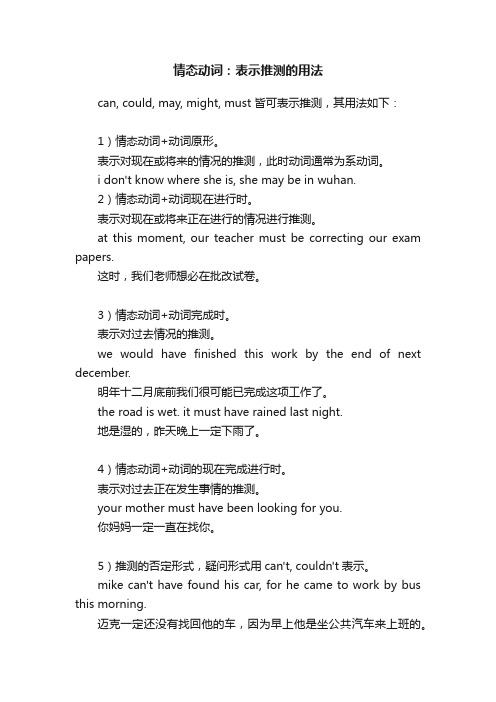
情态动词:表示推测的用法can, could, may, might, must 皆可表示推测,其用法如下:1)情态动词+动词原形。
表示对现在或将来的情况的推测,此时动词通常为系动词。
i don't know where she is, she may be in wuhan.2)情态动词+动词现在进行时。
表示对现在或将来正在进行的情况进行推测。
at this moment, our teacher must be correcting our exam papers.这时,我们老师想必在批改试卷。
3)情态动词+动词完成时。
表示对过去情况的推测。
we would have finished this work by the end of next december.明年十二月底前我们很可能已完成这项工作了。
the road is wet. it must have rained last night.地是湿的,昨天晚上一定下雨了。
4)情态动词+动词的现在完成进行时。
表示对过去正在发生事情的推测。
your mother must have been looking for you.你妈妈一定一直在找你。
5)推测的否定形式,疑问形式用can't, couldn't表示。
mike can't have found his car, for he came to work by bus this morning.迈克一定还没有找回他的车,因为早上他是坐公共汽车来上班的。
注意:could, might表示推测时不表示时态,其推测的程度不如can, may。
解析情态动词表推测

解析情态动词表推测情态动词表推测的三种时态如下:1、对将来情况的推测,用“情态动词+动词原形”。
(1)She must / may / might / could arrive before 5.5:00前她一定/可能/也许到。
2、对现在或一般情况的推测,用“情态动词+be”,“情态动词+be doing”或“情态动词+动词原形”。
(1)He must/may/might/could be listening to the radio now.他一定/可能/也许正在听收音机。
(2)He can't(couldn't)/may(might) not be at home at this time.这个时候他不可能/可能不在家。
3、对过去情况的推测,用“情态动词+ have +过去分词”。
It must/may/might/could have rained last night.The ground is wet.地湿了,昨晚肯定/可能/也许下雨了。
情态动词表推测可能性大小的排列情态动词有must,can/could may/might,can't/couldn't。
表示推测的情态动词有must,can,could,may,might 等,且语气由左向右依次减弱。
could,might并不一定是can,may的过去式,有时只是语气分别比can,may更弱。
常见的表示推测的情态动词:must, could, may, might, may not, can’t1) 表示肯定推测时,可能性:must一定>could 可能>may也许>migh也许,表示对现在发生的事的推测例如:It is 9:00 p.m. She must be at home. 晚上九点了。
她现在一定在家。
注意:must只用于肯定句如果表示“一定不”,用can’t:She can’t be at home. 她一定不在家。
- 1、下载文档前请自行甄别文档内容的完整性,平台不提供额外的编辑、内容补充、找答案等附加服务。
- 2、"仅部分预览"的文档,不可在线预览部分如存在完整性等问题,可反馈申请退款(可完整预览的文档不适用该条件!)。
- 3、如文档侵犯您的权益,请联系客服反馈,我们会尽快为您处理(人工客服工作时间:9:00-18:30)。
例 2: --_____the news be true? —No, it_____be true. A. Can, can’t B. May, can’t C. May, may not D. Must, mustn’t
析: 选A。ຫໍສະໝຸດ 重点一Can--can’t
vs Must--mustn’t Can表示具有某种能力,表示推测意为“不可能/
析: 选B。 由语境可知,我真的为你担心,所以你不应该一 句话不说就离开家,但实际上你确实这么做了, 显然应填shouldn’t/ought to have left,表示责 备。
(一)should /ought to have done本来应做 而未做,表达遗憾感情色彩 should /ought not to have done本来不应 做而做了,表达遗憾感情色彩
例2: The light in his room is still on, so he _____ to bed. A. mustn’t have gone B. must have gone C. shouldn’t have gone D. can’t have gone 析:选D。由于他房间里的灯还亮着 推测,他不可能已经上床睡觉了, 应填can’t have gone 。
情态助动词的推测性用法
能做推测性用法的情态动词:共九个
情态动词 might / may could / can 非推测性用法 表示许可 表示能力许可 推测性用法 表示可能 表示可能
should/ ought to 表示义务: “应该”表示必然:“应该” would/will must 表示意志
表示义务: “必须”
例1: --Are you coming to Jeff’s party? --I’m not sure. I ____go to the concert instead. A. must B. would C. should D. might
析:选D。I’m not sure.的语境表明把握性不 大,当然我去参加音乐演奏会的可能性就 比较小了,故不用must应用might
3.说话人推测的事情所发生的时间要根据情态动 词后的动词形式来定,可以是现在,过去,将来, 一般动词是非完成体形式则表示现在或将来,动 词是完成体形式则表示过去时间,但完成进行体 有两种可能一是相当于现在完成进行体,一是相 当于过去进行体 He must be there.:现在 Our team might win the race.:将来 He must be working late at the office.:现在(进 行) He must be calling tonight.:将来 He may have come last year.:过去 They can’t have been waiting so long:表现在完 成进行 He must have been dozing.:过去 “进行”
选C。分析语境可知,口头上告知Sally如何去那里是不 够的,所以我本应书面告知,却有没书面告知之,显 得应使用should /ought to have written表示遗憾之情
例2: I was really anxious about you, you_____home without a word. A. mustn’t leave B. shouldn’t have left C. couldn’t have left D. needn’t leave
重点二 情态动词的完成式用法
例1:I told Sally how to get there, but perhaps I ____for her. A. had to write it out B. must have written it out C. should have written it out D. ought to write it out
(二)
may/might have done可能已做
must have done 一定已做 can’t have done不可能已做
例1:--Where is my pen? -- I _____it. A. might lose B. wouldn’t have lost C. should have lost D. must have lost
表示推测:“估 计一定”
表示必然: “一定”
按可能性的程度的高低这九个情态动词可 分为三档 一,表“可能”: might / may/could / can 二,表“很有可能”: should/ ought to / would/will 三,表“最有可能”:must
2. 能做推测性用法的情态助动词的句法特征 A. 其后的不定式可以采取完成体形式 You must have thought about that. B.其后的不定式可以采取进行体形式 He must be working late at the office. C.可以用于there-存在句 There must be some mistake. D.其后的不定式为一般形式时通常是静态动词。 He must be there. E.主语可以使表示无生命的名词词组。 It must be George.
可能”,多用于否定句和疑问句中 eg. 1.Where can he have gone?他可能会去 2.It can’t be true.这不可能是真的。 哪儿呢? must表“义务”或“强制”,表示主观的必要; 表推测意为“一定”,用在肯定句中。 mustn’t:表“禁止” eg.1.We must clean the room.(表示我们认 为房间太脏了。) 2.He must be at home before supper.(他 晚饭前一定在家。) 即表推测的must的否定形式是can’t而不是mustn’t
